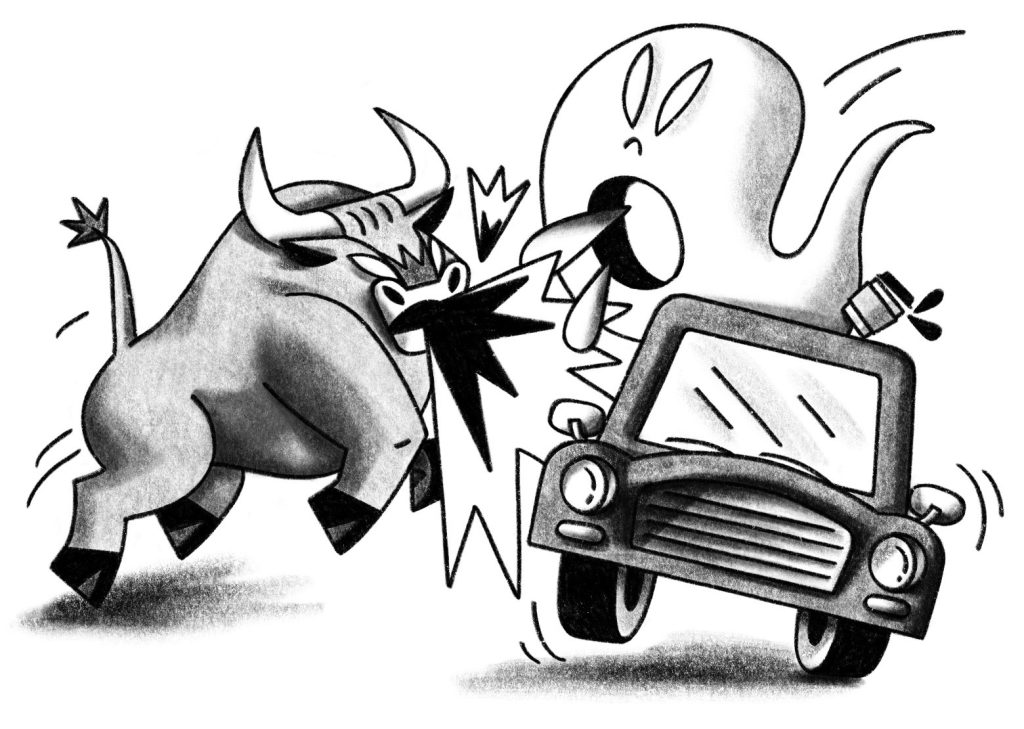There are two words that best describe River Mumma: “fast” and “furious”— although “different” would be a close third. Indeed, Zalika Reid-Benta’s debut novel takes a sharp left turn from Frying Plantain, her short story collection from 2019. That book was grounded in the realities of Toronto’s Little Jamaica. This one has a more fantastical quality to it. Part dream vision, part thriller, replete with curses, ghosts, and mysticism, River Mumma proves a fun if at times formulaic page-turner.
Set in present-day Toronto, the novel opens on a holiday celebration begrudgingly attended by its melancholy protagonist, Alicia Gale. Several months ago, the starry-eyed twenty-six-year-old finished grad school in New York, earning a master’s in English and founding a literary magazine along the way. Now she’s once again living with her overbearing mother, working a dead-end retail job, and depressed. She’d thought she was “on her way to becoming the next Toni Morrison of publishing,” but upon graduation she’d encountered “a wasteland in place of the opportunities she’d been promised.” Back in Ontario, “everything seemed pointless, including and especially this party.”
Her moody reflections are interrupted when, as she’s walking home, a cyclone sucks her into an alternate universe. In a “strange” version of a familiar west-end park, she meets River Mumma, the water deity from Jamaican folklore. The mermaid with “blue-black skin and gorgeous loc’d hair” informs Alicia that someone in the human world has stolen her golden comb, the source of her powers: “And yuh have til sundown tomorrow fi get it.” If Alicia fails, River Mumma will disappear —“Mi g’way”— and rivers everywhere will dry up, threatening all life on the planet. Alicia wonders if someone else is better suited to the task, but she’s told she has no say in the matter: “Too late. Yuh already been chosen.”

A novel that is fast, furious, and full of malevolent spirits.
Gwendoline Le Cunff
After what she first assumed was a dream, Alicia goes on the hunt. She’s understandably nervous, though glad to have a sense of purpose beyond minding a cash register or responding to her mom’s endless texts. She enlists the help of two work friends: Heaven, a stylish polymath who knows all about Jamaican mythology, and Mars, an outgoing goofball who somehow “understood her ennui in a way no one else did.” While initially skeptical of Alicia’s story, the pair become convinced when a fire-breathing black bull called a Rolling Calf materializes and nearly kills them. (“So you’re for real,” Heaven nonchalantly concedes.) As it turns out, River Mumma’s nemeses, malevolent spirits called duppies — of which the Rolling Calf is a particularly nasty variety — don’t want the comb found.
Undeterred, the trio launch a search that takes them across the city, from the Humber River and Glendon Forest to the University of Toronto’s Convocation Hall. They wind up at the Fairmont Royal York, the downtown hotel that resembles “an expensive collector’s item maintained by the kind of wealthy men who built ships in bottles.” There they meet an opportunistic entrepreneur, Sidney Roy, who has smuggled the comb from Jamaica to Canada and gifted it to her “celebrity investor,” an unnamed rapper who’s clearly a stand in for Drake. The novel’s climax arrives as Alicia, Heaven, and Mars travel to the superstar’s luxurious mansion in the ritzy Bridle Path neighbourhood and attempt to convince him to return the comb — lest he condemn all life on earth to an untimely demise.
Those looking for escapism will find much to like about River Mumma. The plot flies, the action thrills, and the main characters are believable, sympathetic twentysomethings. (They certainly talk the part with slang like “fam,” “OG,” and “sus.”) Although it prioritizes efficiency over innovation, Reid-Benta’s writing has its moments. Lush foliage is “Dorothy-crashing-into-Technicolor green.” A ghost materializes with a hole in his chest that’s “oozing blood in translucent white gushes.” One terrifying duppy, the Whooping Boy, possesses “unnatural pointed features like a warped Pinocchio.”
Reid-Benta also offers a subtle critique of capitalism. At a Tim Hortons, ready to lay out her plan to save the world, Alicia insists that one of her friends first “order something or we’re going to get kicked out.” Tasked with tracking down the missing comb, Mars balks at the prospect of losing a day’s pay: “Do you know how much money I have in my account? Just enough for end-of-month fees and OSAP,” in reference to his student loans. On the run from duppies, Heaven bemoans Uber’s “surge prices.” With the fate of the world at stake, such financial concerns are comparatively trivial. They’re played for comedic effect, while Reid-Benta’s larger point is clear: any system that would raise such impediments in the face of a truly existential threat cannot be considered ideal.
Other attempts at profundity are less successful. Toward the end of the novel, Alicia undergoes some ill-defined metaphysical awakening at the hands of River Mumma: “Nothing happened and yet something did happen.” Then, suddenly, Alicia feels “a certainty in herself, an inner recognition of her own ability to get through the day.” Indeed, “the simple act of inhaling and exhaling” has become “not a passive necessity but an active link to the world around her.” Such pseudo-philosophical gobbledygook is probably best left to fortune cookies and undergraduate essays. As for the conclusion, it’s hard to imagine the reader who won’t see it coming.
Alexander Sallas can now collect his frequent flyer miles as Dr. Sallas.

